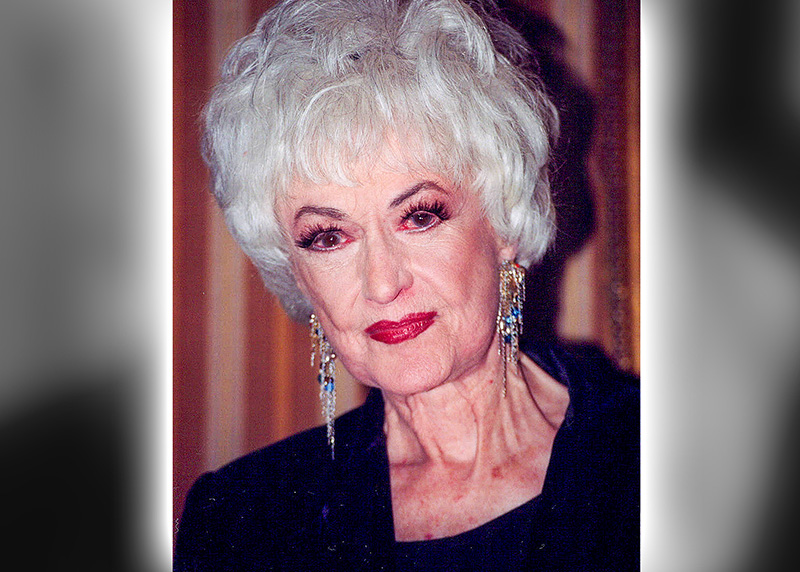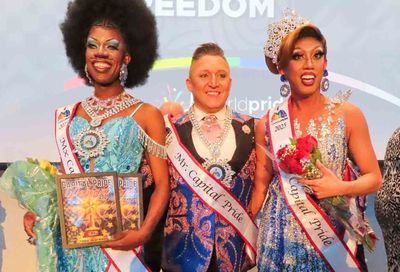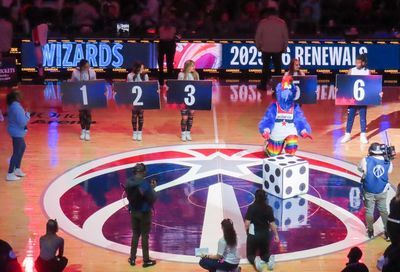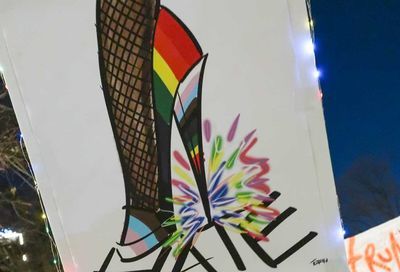Report: 1 in 3 Trump circuit court nominees has history of anti-LGBTQ bias
Report targets Republican senators for complicity in allowing unqualified or biased nominees to be confirmed
By John Riley on January 6, 2019 @JRileyMW

A new report by Lambda Legal examining President Trump’s judicial nominees over the past two years warns that a Republican-led Senate is more likely to confirm nominees with a history of anti-LGBTQ animus — even if they have been rated “not qualified” by the American Bar Association.
The report claims at least 15 of Trump’s 43 nominees to open seats on federal circuit courts — or about 1 in 3 — have a record of rulings or statements that have demonstrated a bias or even outright hostility towards LGBTQ individuals.
Hostile nominees who were eventually confirmed by the Senate include: 5th Circuit Judge Kyle Duncan, 3rd Circuit Judge David Porter, and 8th Circuit Judge L. Steven Grasz.
Currently, two nominees whose nominations to the conservative 6th Circuit have yet to be voted on — Chad Readler and Eric Murphy — have also been flagged by Lambda Legal for their stances on LGBTQ rights issues, including defending Trump’s transgender military ban, arguing that civil rights laws do not prohibit discrimination based on sexual orientation, and defending same-sex marriage bans, with Murphy opining publicly that marriage equality is “disrupting to our democracy.”
In addition, some Trump nominees to federal district courts who have not yet been confirmed have problematic views on LGBTQ rights, the report notes. Gordon Giampietro, who was nominated to the U.S. District Court for the Eastern District of Wisconsin, is under fire for comments disparaging marriage equality and same-sex couples. Matthew Kacsmaryk, a nominee to the U.S. District Court for the Northern District of Texas, has called the very idea of gender identity “problematic” and argued that states do not have an interest in protecting LGBTQ people from discrimination based on sexual orientation.
Others on the list include: Howard Nielson, a nominee to the U.S. District Court for Utah, who said a gay judge overseeing the Proposition 8 case in California could not be impartial due to his sexual orientation and the fact that was in a same-sex relationship; Allison Jones Rushing, nominee to the 4th Circuit Court of Appeals, who criticized the majority in U.S. v. Windsor for ruling that the Defense of Marriage Act’s stated moral disapproval of same-sex marriage was unconstitutional; and Stephen Clark, nominee to the U.S. District Court for the Eastern District of Missouri, who claimed legalizing same-sex marriage would lead to legalized polygamy.

Lambda Legal notes in its report that the Trump administration more than doubled its number of confirmed circuit judges in 2018, compared to the previous year, and the number of confirmed federal district court nominees was eight times higher than the number confirmed in 2017.
Aided by a Republican-led Senate that increased its numbers in November’s election, Trump has been able to get many of his nominees confirmed, something that Senate Majority Leader Mitch McConnell said would be his “top priority” over the next two years. Previously, only two Republicans needed to cross party lines in order to stop controversial judges from being confirmed. Yet that rarely occurred, and the number of Republicans needed to defeat a nominee has since risen to four — thereby making it more likely that even controversial or objectionable nominees will be confirmed.
Under the leadership of McConnell and Senate Judiciary Chairman Chuck Grassley, the Senate has essentially dispensed with the “blue slip” process — a procedure under which the home-state senators of a nominee are given the opportunity to express approval or opposition to a nominee based on their judicial record. Historically, the Judiciary Chairman would honor objections from senators who refused to return a “blue slip.” But under President Trump, Republicans have moved to confirm as many conservative judges as possible — regardless of how objectionable their views might be. In the past two years, five judges were granted hearings over the objection of a home state senator.
As a result of this accelerated confirmation push by Senate Republicans, Trump nominees comprise over 25% of all judges on five of the nation’s 12 circuit courts. The 8th Circuit has seen the most significant transformation, with 33% of its seats being filled by Trump nominees, followed by the 7th, 5th, 11th, and 6th Circuits.
“This massive shift in the U.S. Courts of Appeals, which is often the courts of last resort, 15 threatens to do lasting damage to the civil rights of LGBT people,” the report reads.
Most alarmingly, from Lambda Legal’s perspective, is that 85% of Trump’s circuit court nominees are members of the Federalist Society, a group advocating and strict constructionist interpretation of the law (and thereby inherently hostile to LGBTQ rights that were not enumerated in said laws).
The Federalist Society has long had the aim of reshaping the courts — and thus, legal precedent — by getting as many of its members confirmed to federal judicial positions as possible. Examples of Federalist Society nominees include 5th Circuit Judge Kyle Duncan, Brian Buescher, a nominee to the U.S. District Court for the District of Nebraska, and Supreme Court Justice Brett Kavanaugh.
A substantial number of Trump’s judicial picks have also been rated “not qualified” by the American Bar Association. While only 12 nominees who were rated “not qualified” have been confirmed over the past two decades, four of them are Trump nominees. Another Trump nominee, Brett Talley, withdrew his nomination, and the nomination of a sixth Trump nominee who was rated “unqualified” — John O’Connor, nominated to the Northern, Eastern, and Western Districts of Oklahoma — is still pending.
Two of those nominees, L. Steven Grasz and Jonathan Kobes, who were both nominated and confirmed to the 8th Circuit Court of Appeals, were flagged by progressive and LGBTQ groups for past anti-LGBTQ statements and advocacy.

Grasz, who previously served on the board of the conservative Nebraska Family Alliance, was unanimously rated “not qualified” by the ABA, in part because the organization’s committee that deals with ratings felt he would not be able to impartially judge cases involving LGBTQ parties. Kobes, who was previously criticized for not having demonstrated an ability to perform complex legal analysis and communicate that through writing, was also viewed as problematic due to his stated opposition to marriage equality and LGBTQ rights.
“Judges protect what we value most in society,” Sharon McGowan, the legal director and chief strategy officer of Lambda Legal, said in a statement. “No matter who you are, where you come from, what you look like, or who you love, we all deserve judges who can be fair and impartial. That’s why protecting our courts needs to be a two-party job. Democrats and Republicans alike owe it to the American people to ensure that the federal courts remain an impartial institution administering ‘equal justice for all,’ not just the wealthy and the powerful.
“As our nation faces unprecedented attacks on our values and the rule of law, Lambda Legal will continue to demand vigorous debate and bipartisan scrutiny for each and every nominee, especially those who have a history of defending and disseminating LGBT bias,” she added. “Together, we must protect an independent judiciary from the hateful rhetoric and partisan politics we have seen from the Trump Administration.”
Anheuser-Busch, Others Drop Funding for San Francisco Pride
Several corporate sponsors have pulled financial support for this year's San Francisco Pride, resulting in a $300,000 shortfall.
By John Riley on March 24, 2025 @JRileyMW
Several corporate sponsors of San Francisco Pride, including beer giant Anheuser-Busch, have pulled their funding for the celebration's annual festivities.
Over the past four weeks, the companies have informed organizers of San Francisco Pride that they would not be able to support 2025 Pride, claiming a lack of funds as the reason.
None of the companies cited the political climate, but Suzanne Ford, the executive director of San Francisco Pride, said that it was "very abnormal" for several multi-year sponsors to drop their support.
"I just interpreted that companies are making decisions that at this time it’s not good to be sponsoring Pride," Ford told SFGATE magazine, alluding to decisions by several major corporations to abandon diversity, equity, and inclusion (DEI) initiatives.
Bea Arthur’s Air Force Bio Purged by Department of Defense
The DOD removed a page on actress Bea Arthur's military service to purge references to diversity and LGBTQ content.
By John Riley on March 27, 2025 @JRileyMW
A page touting Golden Girls actress Bea Arthur's military service during World War II was reportedly scrubbed from the U.S. Department of Defense website as part of the Trump administration's overzealous efforts to purge anything related to diversity or LGBTQ identity.
Last week, X user @swiftillery noted that the article on Arthur -- first published in October 2021 -- had been removed from the Defense Department website.
According to The Advocate, the Internet Archive documented a "404 -- Page Not Found" message at the URL where the article had been housed.
Gay Nightclub Bans All MAGA-Related Attire
Log Cabin Republicans balk at the Sacramento nightclub's ban on MAGA gear after patrons complained about one man's pro-Trump cap.
By John Riley on March 23, 2025 @JRileyMW
A popular LGBTQ nightclub in Sacramento, California, is prohibiting patrons who wear MAGA-related attire from entering the establishment.
Badlands, in the city's Lavender Heights district, announced the policy on social media. Management claimed they were motivated to impose the ban after a patron wore a MAGA hat while in the bar, leading some patrons to complain that they were made to feel uncomfortable and unsafe.
"At Badlands Sacramento, we are committed to creating a space where the LGBTQ+ community and our allies feel safe, welcomed, and respected," TJ Bruce, the bar's owner, wrote in a social media post. "Recently, a guest entered the bar wearing MAGA attire, which led to some discomfort among patrons.
Support Metro Weekly’s Journalism
These are challenging times for news organizations. And yet it’s crucial we stay active and provide vital resources and information to both our local readers and the world. So won’t you please take a moment and consider supporting Metro Weekly with a membership? For as little as $5 a month, you can help ensure Metro Weekly magazine and MetroWeekly.com remain free, viable resources as we provide the best, most diverse, culturally-resonant LGBTQ coverage in both the D.C. region and around the world. Memberships come with exclusive perks and discounts, your own personal digital delivery of each week’s magazine (and an archive), access to our Member's Lounge when it launches this fall, and exclusive members-only items like Metro Weekly Membership Mugs and Tote Bags! Check out all our membership levels here and please join us today!
The Magazine
-
Most Popular
 Jared Polis Signs Law Repealing Colorado's Gay Marriage Ban
Jared Polis Signs Law Repealing Colorado's Gay Marriage Ban  Transgender Blackhawk Pilot Sues Right-Wing Influencer
Transgender Blackhawk Pilot Sues Right-Wing Influencer  Gay Army Reserve Officer in Uniform Sex Video Scandal
Gay Army Reserve Officer in Uniform Sex Video Scandal  Air Force Reverses Ban on Pronouns in Email Signatures
Air Force Reverses Ban on Pronouns in Email Signatures  White House Ignores Reporters with Pronouns in Email Signatures
White House Ignores Reporters with Pronouns in Email Signatures  Charges Dropped in Nancy Mace Assault Case
Charges Dropped in Nancy Mace Assault Case  Hugh Bonneville Delivers a Show-Stopping Vanya
Hugh Bonneville Delivers a Show-Stopping Vanya  White House Demands NIH Study Transgender Transition "Regret"
White House Demands NIH Study Transgender Transition "Regret"  'Porn Star University' Started by Gay-for-Pay Creator Andy Lee
'Porn Star University' Started by Gay-for-Pay Creator Andy Lee  WorldPride Warns International Trans Visitors About Travel Risks
WorldPride Warns International Trans Visitors About Travel Risks
 Jared Polis Signs Law Repealing Colorado's Gay Marriage Ban
Jared Polis Signs Law Repealing Colorado's Gay Marriage Ban  White House Ignores Reporters with Pronouns in Email Signatures
White House Ignores Reporters with Pronouns in Email Signatures  White House Demands NIH Study Transgender Transition "Regret"
White House Demands NIH Study Transgender Transition "Regret"  Air Force Reverses Ban on Pronouns in Email Signatures
Air Force Reverses Ban on Pronouns in Email Signatures  Transgender Blackhawk Pilot Sues Right-Wing Influencer
Transgender Blackhawk Pilot Sues Right-Wing Influencer  'cullud wattah' is a Compelling Drama About Flint's Toxic Water
'cullud wattah' is a Compelling Drama About Flint's Toxic Water  Gay French Thriller 'Misericordia' is Creepy and Suspenseful
Gay French Thriller 'Misericordia' is Creepy and Suspenseful  Hugh Bonneville Delivers a Show-Stopping Vanya
Hugh Bonneville Delivers a Show-Stopping Vanya  This Week's Advertisers: Rep. Becca Balint - April 10, 2025
This Week's Advertisers: Rep. Becca Balint - April 10, 2025  WorldPride Warns International Trans Visitors About Travel Risks
WorldPride Warns International Trans Visitors About Travel Risks
Scene
Metro Weekly
Washington's LGBTQ Magazine
P.O. Box 11559
Washington, DC 20008 (202) 638-6830
About Us pageFollow Us:
· Facebook
· Twitter
· Flipboard
· YouTube
· Instagram
· RSS News | RSS SceneArchives
Copyright ©2024 Jansi LLC.










You must be logged in to post a comment.